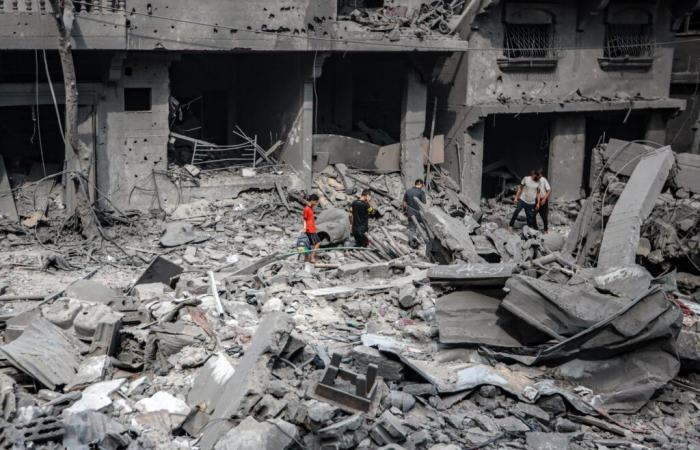LThe words chosen by these NGOs are strong: “ethnic cleansing” and “acts of genocide”. The horror has unfortunately become part of normality.
Since the Hamas attack on October 7, 2023, which killed 1,208 Israelis, a wave of reprisals of unprecedented violence has fallen on Gaza, which is no longer a conflict zone, but rather an open-air cemetery. . In this territory, already strangled by a 17-year blockade, there is no more life. Just precarious survival, a daily struggle against falling bombs and crumbling walls.
“Life in a death trap” is the title of the MSF report. And for good reason. More than 45,000 Palestinians killed, the majority civilians, medical infrastructure reduced to nothing and 90% of the population displaced.
Between October 2023 and September 2024, more than 500 attacks affected health infrastructure. Nineteen hospitals became inoperable, depriving thousands of injured people of vital care. MSF also reports that its teams were forced to evacuate 17 times, leaving behind patients whose only crime was needing help.
Added to this are equally alarming figures concerning the living conditions of the displaced. Nearly two million people are crammed into unsanitary shelters, without drinking water or sufficient food. Diseases spread at lightning speed: respiratory infections, diarrhea and malnutrition. Children bear the weight of this war with heightened vulnerability.
Furthermore, Israel maintains a suffocating siege on Gaza, authorizing only 37 trucks of humanitarian aid per day in October 2024, compared to 500 before the conflict. The north of the territory, notably the Jabalia camp, is undergoing an offensive described as “extreme violence”.
Furthermore, despite the cries of NGOs, the Israeli authorities block 98.4% of requests for medical evacuations.
This assessment is surgically cold, almost indecent in its precision. However, this is only part of the daily reality of Gazans.
How can we speak of human dignity when thousands of children sleep in rubble, deprived of basic care and food? When families have to choose between dying from bombs or starving?
In short, Gaza has become an uninhabitable land where vital infrastructure is methodically destroyed. Medical teams speak of a health system in agony.
A chilling testimony illustrates this reality: “every day in July, it was one shock after another. I saw an eight-year-old girl die alone on a stretcher in a crowded emergency room. In a functional health system, she would have been saved,” confides Dr Javid Abdelmoneim, from MSF. Like her, hundreds of people died due to lack of proper care.
Bombs and numbers
A missile on Gaza is one more statistic in a conflict that transforms human beings into percentages and graphs.
But behind every number, there is a story. That of a 33-year-old mother, with a mutilated son and a killed husband: “my son lost his leg in an explosion. My husband died in the same attack. Now my son no longer speaks. He didn't say a word for ten days after seeing his father dead.
That, also, of a 19-year-old girl, one of whose legs had been amputated, discovering the horror under the rubble. “I was injured on August 21 when the house I was in was bombed. A missile entered the room and fell into the basement. My leg had to be amputated. Everyone in the basement is dead, about 30 to 40 people. When I woke up under the rubble, I was screaming,” she says.
Each story is a slap in the face to anyone who still dares to look away.
What is shocking about this tragedy is not only the scale of the destruction, but also the complicit silence of the great powers. The international community is watching, visibly caught between the moral obligation to act and the comfort of political inaction. Israel's close allies, starting with the United States, continue to provide it with unconditional support, turning a blind eye to its criminal acts. Acts that certain experts and NGOs, including Human Rights Watch, do not hesitate to describe as “genocide”.
A term that bothers even the United States, which expressed its disagreement with the conclusions of the HRW report also published on December 19. HRW accuses Israel of deliberately restricting access to drinking water for Palestinians, an act that could fall under international criminal law. The word genocide is loaded with meaning, and its use here raises debate.
But can we decently deny the obvious? Deliberately depriving a population of water, an essential good for life, is not a collateral accident. It's a strategy. To call it anything else would be an affront to Gazans and their suffering.
With this cynicism from Israel, ultimately what will be left of Gaza when the bombs stop falling? A traumatized population and a devastated land, where the unacceptable has become the norm, and where horror has taken a lasting hold in consciousness.
F. Ouriaghli






